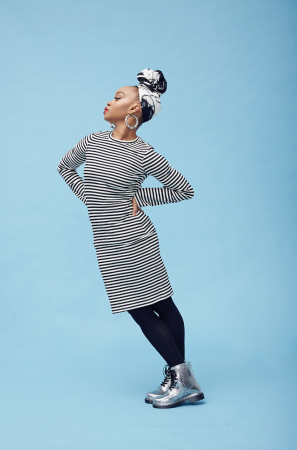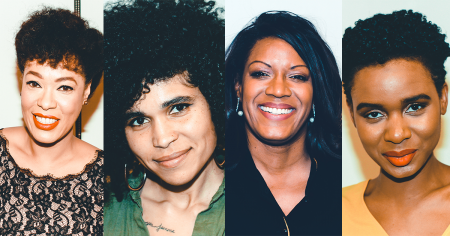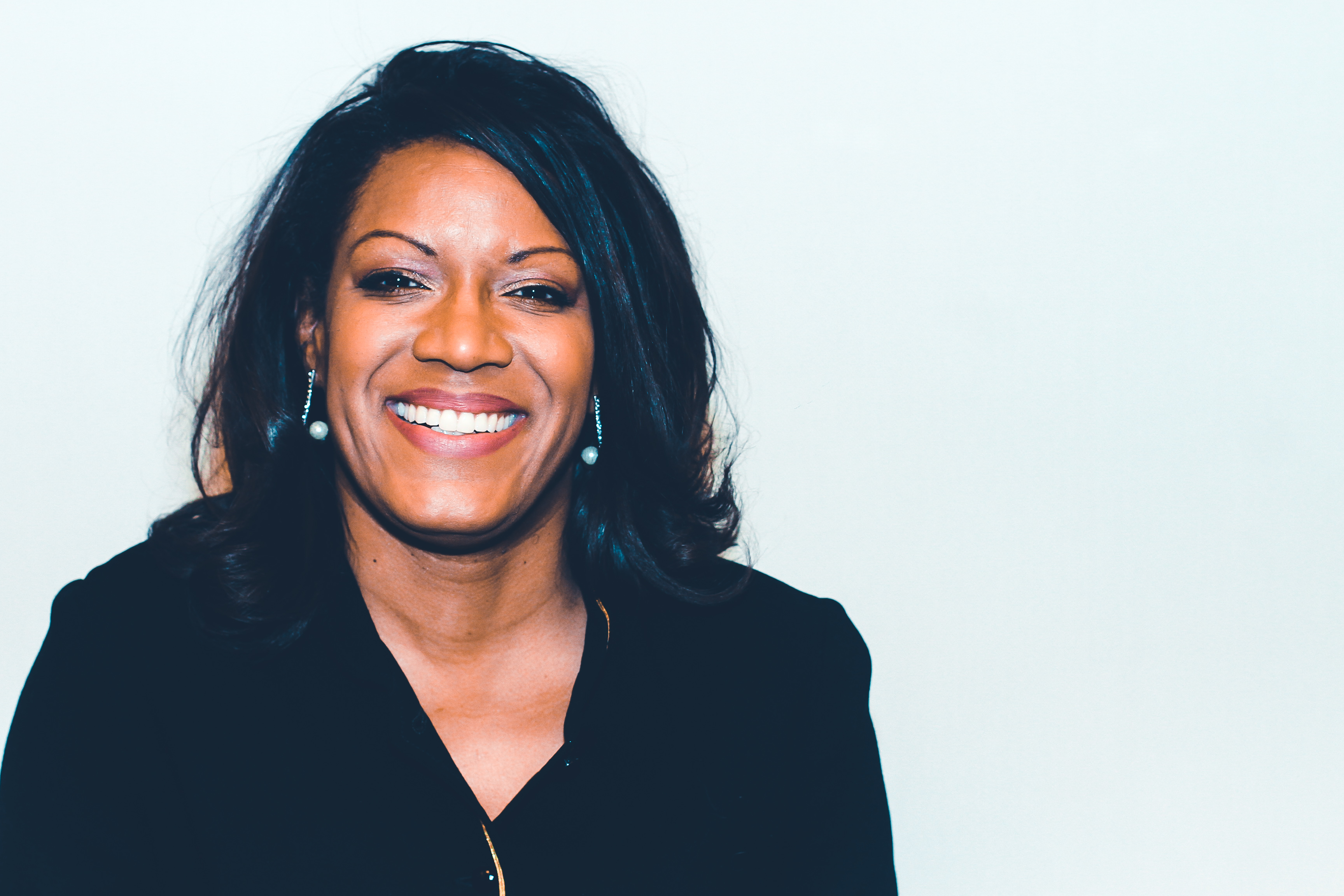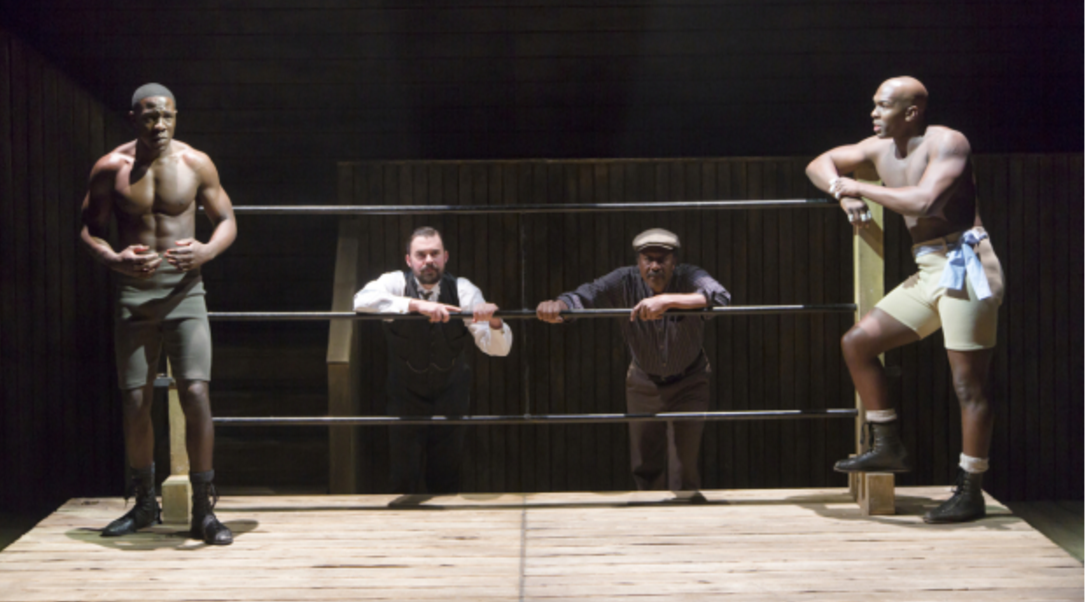

Features
Photo Exclusive: Step into The Light with Broadway Black
Published
7 years agoon
Have you seen The Light by Loy A. Webb at MCC Theater? If you haven’t, then you need to and Broadway Black has got you. Join us on SUNDAY MARCH 3rd for the BWAYBLK Experience!
Use code BWAYBLACKMCC and pay $35 for any seat on Mar 3 at the 7:30 performance
Not every marriage proposal goes as planned. LOY A. WEBB’s THE LIGHT introduces us to RASHAD and GENESIS on what should be one of the happiest days of their lives, but their joy quickly unravels when ground-shifting accusations from the past resurface in this gripping two-character drama. Can their relationship survive the growing divide between them over who–and what–to believe?
Also, get into this amazing photo series of playwright Loy A. Webb & the cast of her play The Light. Photos by Curtis Brown were taken in the new elegantly designed and strategically welcoming Robert W. Wilson MCC theater space. Located in midtown New York on 52nd and 10th ave (511 W 52nd ST
New York, NY 10019)
On another tip, some really dope creatives will do a talkback after the Saturday matinee performance that you might be interested in attending. Make sure to RSVP.
Panelists include: Nissy Aya, Cristina Pitter, Alicia Rodis & Kavita Mehra
THIS WEEKEND SAT FEB 23rd
LOY A. WEBB’s THE LIGHT at MCC Theater delves deeply into one couples’ reckoning with an encounter with sexual violence that has left audiences asking: as a partner, a family member, a friend, how do we support sexual assault survivors? And what responsibility do artists have to create work that is trauma-informed? On SAT FEB 23 at 4:00 PM for an in-depth conversation about the power of allyship rooted in love and healing – in our lives and on our stages – in the face of trauma.
SAT FEB 23 at 4PM
THE ROBERT W. WILSON MCC THEATER SPACE
511 W52 ST
RSVP HERE.
Founder/Editor-In-Chief of BroadwayBlack.com | Actor | Artist | 1/3 of @OffBookPodcast | Theatre connoisseur | All Audra Everything | Caroline over Change | I'm Not Charl Brown | Norm Lewis is my play cousin | Producing an all-black production of Mame starring Jenifer Lewis in my head

You may like
Features
A Superhero On & Off The Stage, Camille A. Brown Brings ink
Published
7 years agoon
February 5, 2019

Camille A. Brown Photo by Whitney Browne
Camille A. Brown‘s dance company, Camille A. Brown & Dancers, tours nationally and internationally and will be presenting six performances featuring the debut of ink at The Joyce Theater NYC Feb 5-10th 2019.
Propelled by the live rhythms and sounds of traditional African and handmade instruments, Camille A. Brown’s ink celebrates the rituals, gestures, and traditions of the African diaspora. Highlighting themes of brotherhood, community, and resilience, the work seeks to reclaim African American narratives and is the final installment of Brown’s dance theater trilogy about identity.
In addition to her company works, Ms. Brown brings her passion for storytelling to her award-winning choreography for Broadway, Television, and Off-Broadway. Productions include Tony Award Winning Once On This Island, (Drama Desk, Outer Critics and Chita Rivera award nominations), Emmy Award Winning Jesus Christ Superstar Live on NBC, A Streetcar Named Desire, Choir Boy, the upcoming Magic Mike The Musical, PAL JOEY.
We had the chance to probe a little bit into the world of Camille A. Brown, and we’re grateful for the insight and wisdom with which she was able to bless us. Check out the interview below along with an excerpt from ink.
Broadway Black (BB): After forming the idea, what was the process of building ink?
Camille A. Brown (CAB): After the creative process for BLACK GIRL: Linguistic Play, I held a desire to dig even deeper and tell more stories of ritual, gestural vocabulary, and traditions of the African Diaspora. I was immediately drawn to two albums that had a significant impact on me when I was growing up. The Miseducation of Lauryn Hill by Lauryn Hill, and Like Water for Chocolate by Common. I tasked myself with creating a movement language that embodied the same raw authenticity, and vulnerability that fuels those lyrics and music.
As I began to develop the concept for ink, I wanted the dancers to represent superheroes. I couldn’t figure out why I had the urge to play with this idea until I read Question Bridge: Black Males in America. One of the men interviewed said, “I see Black people as comic book heroes because they always keep rising.” That was it! It is about showing that in our basic survival, and natural attributes we have superhuman powers. Powers to shift, overcome, transform, and persevere even within an often hostile environment. The seven sections of ink represent super powers of spirituality, history and heritage, the celebration of the Black female body, Black love, brotherhood, exhaustion, and community.
The process involves a deep collaboration with the dancers and my direction is guided by their choice making.
The space is very organic and fueled by research. My dancers, musicians, dramaturgs, and I are in constant dialogue throughout the process about the work and how it’s progressing. We don’t move forward unless we’re all on the same page.
We are building the work together. As a disclaimer, I let everyone know the process will be exceptionally tedious. Like a fine comb, I go through each beat, gage the temperature of storylines, and make sure the movement and music are always in conversation (whether aligned or in contrast).
BB: What made you want to start your own dance company and how have you sustained?
CAB: I found my love of choreography in college because I struggled with body image, and found that creating my own voice was a safe and empowering space. After graduating, I danced with Ronald K. Brown/Evidence for 5 seasons and during my second year with The Company, a friend from college (Amy Page) sent me a flyer for the Hubbard Street 2 competition which picks 3 choreographers to create work on the Company. I was chosen! That gave me the encouragement to pursue choreography. My first idea was to take an alias like female writers used to do because even at 22, I knew the playing field was not leveled and women (particularly black women) did not get as much exposure as male choreographers. Dance is revealing and vulnerable so taking an alias wasn’t a realistic option. People would have to see me as I am, but I also needed the confidence to withstand the obstacles. Not only that, having a company seemed daunting.
Ron wore so many hats. He was the director, choreographer, teacher, and also took on administrative duties. He never got a break. I wasn’t confident I could handle all of the duties.
I set work on other companies, but soon realized it wasn’t for me. 1-4 weeks working with a Company wasn’t enough time for me to really hone my skills, find my voice, and discover my personal creative process. I desired a more intimate relationship and space with my dancers and collaborators. I had my first show at Joyce SoHo in 2006, and committed to having a company in 2010.
What sustains CABD is my team. I have a company agent (Pamela Green), Managing Director (Indira Goodwine), Company Manager (Michelle Fletcher), and a production team who holds things down.
In the beginning, I was doing ALL the jobs! As time went on, my team slowly formed. It’s really about patience and perseverance. Nothing happened over night and everything is a progression.
BB: How have you had to be a superhero in your own life personally and professionally?
CAB:
Personally
Last year, I had a life-threatening experience. My appendix ruptured on tour. Appendicitis is when they remove your appendix before it ruptures, but mine actually did and the fluid was in my system for at least a week. I survived the “fatal” stage- which the doctors told me isn’t common. This started a very long year and a half which included 4 hospital stints and two surgeries (my second one was in April). This all happened during Once on This Island (I was in the hospital the first week of rehearsal and had my first surgery during tech), Jesus Christ Superstar Live, and my Company touring. I had to access my “superpowers” and push through, but thankfully I had my team and community to help me.
I’m going to be writing about the entire ordeal because it was such an integral part of my life. People see the “success”, but if they only knew the hardships I had to overcome to get to the other side.
Professionally
Being a Black female Choreographer and Director is hard. People ask me to do I feel like I’ve arrived. Absolutely not. I’m still Black and a woman- two underrepresented groups- particularly in theater. The playing field is still not leveled and I’m clear I have to work twice as hard.
I’ve had to build up strength and confidence. It is an ongoing process of gathering those superpowers. In many spaces, I’m sometimes the only woman (I was the only woman on the creative team for Jesus Christ Superstar Live), and the only black person in some rooms.
Recently two black girls at different events asked me the same exact question: How do you navigate spaces where you’re the only one.
It’s quite easy to feel intimated and shrink yourself. I know I have done that in the past. Now, I’ve found if I think about the black women before me in similar spaces, black women who are currently in similar spaces, and the next generation of black women coming after me, it makes me more confident. When it’s not just about you, it becomes a responsibility.
And even when I don’t feel like I have any superpowers, this happens…
and it refuels and encourages me to keep going. Someone is always watching.
Features
Black Women Playwrights Shine at Third Annual JAG Productions Festival JAGFest3.0!
Published
7 years agoon
February 5, 2019

Maine Anders, Kirya Traber, Tracey Conyer Lee, & Gethsemane Herron-Coward Photo by Drew Shade
For the past two years, JAG Productions has been making waves in the theatre community of White River Junction, Vermont and the ripple effect has made its way to the Big Apple more than a few times. Founder Jarvis Antonio Green and his team have worked religiously to invite Black theatre artists to spend a week in Vermont to further the development of a new play or solo performance. Over the course of the one-week residency, three-five projects receive an intensive workshop, constructive feedback, and a staged reading for the public at Briggs Opera House.
For the third edition of the JAG Productions festival, appropriately titled JAGfest 3.0, presenting new works in African-American theatre, all the playwrights are Black women.
Presented February 8-10, JAGfest 3.0 will include four staged readings of their works, throughout three days, each featuring a post-show conversation with the artists and moderated by Dartmouth scholars.
The JAGfest Dance Party, a celebration of the festival, will take place after the first play on Friday, February 8th, at 9 PM with DJ Sean at Piecemeal Pies in White River Junction, VT. Champagne toast, snacks and free of charge for JAGFest weekend pass ticket holders.
We had the opportunity to meet with each of the playwrights and ask, what does it mean to be a Black Woman playwright in today’s theatre climate? You can find their thought-provoking answers below along with more information about the piece they’ll be presenting at JAGFest3.0, the pioneering festival you’ll be hearing about for years to come.
The Last Day of Black History Month: A Conversation with a Naked Black Southern Lesbian
by Maine Anders & Ayesha Dillabough, & Kia Warren
Directed by Kia Warren & Ayesha Dillabough
Friday, February 8, 7:30 PM

Kia Warren, Maine Anders, & Ayesha Dillabough Photo by Drew Shade
Synopsis: The international “triple threat of burlesque” baptized by Michael Musto as one of ‘NYC’s Creatures of the Night’ in Out Magazine, The “Maine Attraction” Anders (Lady L’Amours Final Bow, Duane Park, Cheek to Cheek: Lady Gaga & Tony Bennett) shares her story of ancestry and artistic resilience with a personal and humorous timeline of our nation’s violent and systematic oppression. Hailing from Decatur, Georgia, Anders’ one-woman master-class on the prominent underbelly of American history, The Last Day of Black History Month… is a multimedia show featuring dance, comedy, music, and poetry unveiling hidden truths while facilitating acceptance, compassion, and unity.
“Beyond the privilege it is to be a playwright and an artist today, I feel that there is a real opportunity and even responsibility to examine and reflect the raw, honest truth, and complexity of what it means to be black and female in a landscape that consciously and subconsciously aims to diminish and even mitigate our responses to this very real experience… and I don’t believe we have the luxury of time to dally… we the creators must do our part to hold space as we foster room for healing both collectively and as individuals.” – Kia Warren
Rabbit Summer by Tracey Conyer Lee
Directed by Christopher Burris
Saturday, February 9, 4:00 PM

Tracey Conyer Lee Photo by Drew Shade
Synopsis: Wilson and Ruby have good jobs, a beautiful home, a child…working on another, while Ruby’s best friend, Claire, has just lost her unarmed Black husband to the quick trigger of a white cop. Wilson idealizes his marriage and ignores the irony of his job as a police officer, smiling through pain Ruby wishes he would share. Tired of feeling helpless and trapped in her Huxtable-like existence, Ruby has a secret plan to fix the American gun problem and push her husband to unpack the legacy of false manhood. As Claire mourns in the comfort of her friends, secrets are unearthed stirring a pot of reality Wilson has never tasted, pitting Black against blue, gun violence against police brutality, manhood against fatherhood and love against need. The trio individually battle to live their truths in a country built on lies while navigating the uniquely American condition of “Being, While Black.”
“Black, female, damn near 50, never married, childless, fiercely choosing to not be what my own incongruous upbringing indicated I should be, abundantly happy, yet unabashedly still figuring it all out, unapologetic and unafraid of what is to be made of my later start in script writing.It’s no secret that representation of my unique perspective wanes in deference to the power of the sexy (read: young, white and male), but I am inspired by the underdog and believe in her place at the table. My age is a career contradiction because my access is as youthful as any BFA candidate, yet I’m mature enough to have fully experienced the evolution of an unprecedented representation dynamic and to have witnessed the myriad stories that fell in the decades-long gaps. It matters that my quarter century acting career began playing roles never written by people who looked like me and has evolved into seeking work written by my friends and peers and writing work for the girls who will never have to experience that same lack. I may not be around long enough to enjoy this side of it for the same tenure I put in without it, but I am grateful and daily cognizant of each day I add to what was, for decades, a representational blight.” – Tracey Conyer Lee
If This Be Sin A New Musical Book by Kirya Traber
Music by Sissi Liu
Directed & Choreographed by Christopher Windom
Saturday, February 9, 7:30 PM

Kirya Traber Photo by Drew Shade
Synopsis: If This Be Sin is a new musical based on the life of the queer Harlem Renaissance entertainer, Gladys Bentley. In 2016 Kirya workshopped the play, Permitted through, the Queerly Fest, the NBT’s Keep Soul Alive reading series, and Submerge at Brooklyn Arts Exchange. The play focused on Bentley’s life at a pivotal moment in the 1940s when she’s lost her prominence and is facing a backlash at the dawn of the MacArthur era. Kirya realized that given grand and spectacular scope of Bentley’s real life, any retelling deserves the spectacle and grandeur of a musical. The new work, If This Be Sin, (whose titled is borrowed from an autobiography Bentley spoke of but likely never wrote) is being developed with a full musical score, and will represent Bentley in her early life as an infamous performer in Harlem, as well as her eventual choice to conform and marry a man in the early 1950’s.
“We’re living in an interesting pop culture moment where Black queer women & femmes are finally receiving some (overdue) acknowledgment for the role we’ve played in shaping culture. But if I’m honest, I don’t trust this moment of praise to endure. It seems like everyone wants to put a Black woman’s name or face on an ad campaign, but I’m still waiting for the textbooks to acknowledge so many women of color who organized and coordinated civil rights movements (long before the 1950’s even). I’m still waiting for the work of Black queer artists throughout history to be exhumed from repression so that we may have greater access to our lineage. In this climate, whether through theatre or in media more broadly, I still see my role as pushing hard for nuance, for specificity, and for truth as I have lived it in my own body. I’m hyper aware that visibility alone will never be enough. I want to take up as much space as I can, and bring as many of my folks as I can along with me for the ride.” – Kirya Traber
Blanks or Sunday Afternoon, After Church by Gethsemane Herron-Coward
Directed by NJ Agwuna
Sunday, February 10, 4:00 PM

Gethsemane Herron-Coward Photo by Drew Shade
Synopsis: Medical student Reese desperately hunts for the romance of her dreams while her “aunties-” Black women through history and media- dissuade, distract and try to save her from love’s violent abandonment- something they all experienced, something they all did not survive. BLANKS interrogates how intimate partner violence, intersectional patriarchy, and neglect affect Black women’s pursuit of romantic and filial love. It asks if love conquers all, what happens when it conquers you?
“Today’s theatre climate is one that’s still marked with insidious, sneaky violence for women of color (see Quiara Algeria Hudes’ experience on the Pulitzer Prize Board) This violence could very well rob us of our humanity, as it so ardently seeks to do.
But, the creativity that comes from living on the margins is unmatched. We, who have not always been seen as women, as being as important as our cherished Black men, we who fight at the intersections of patriarchy and racism, use this hard-earned creativity to penetrate any notion that our stories-and thus our personhood is lesser than. So, in today’s theatre climate, I feel honored to write amongst the warrior women whose stories have always been undeniable-and that the theatre world is now beginning to realize that.” – Gethsemane Herron-Coward











